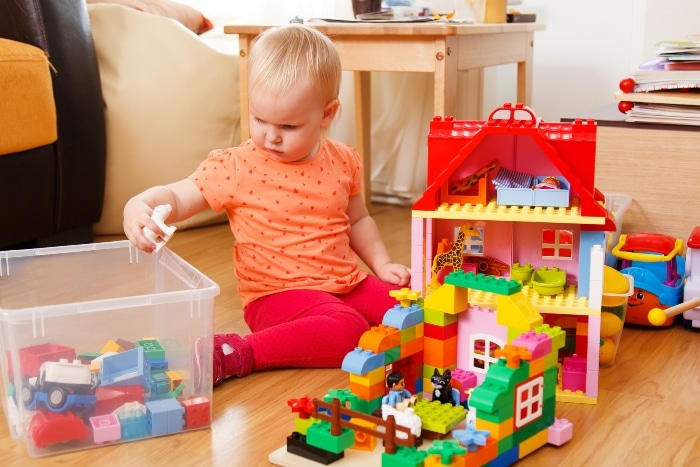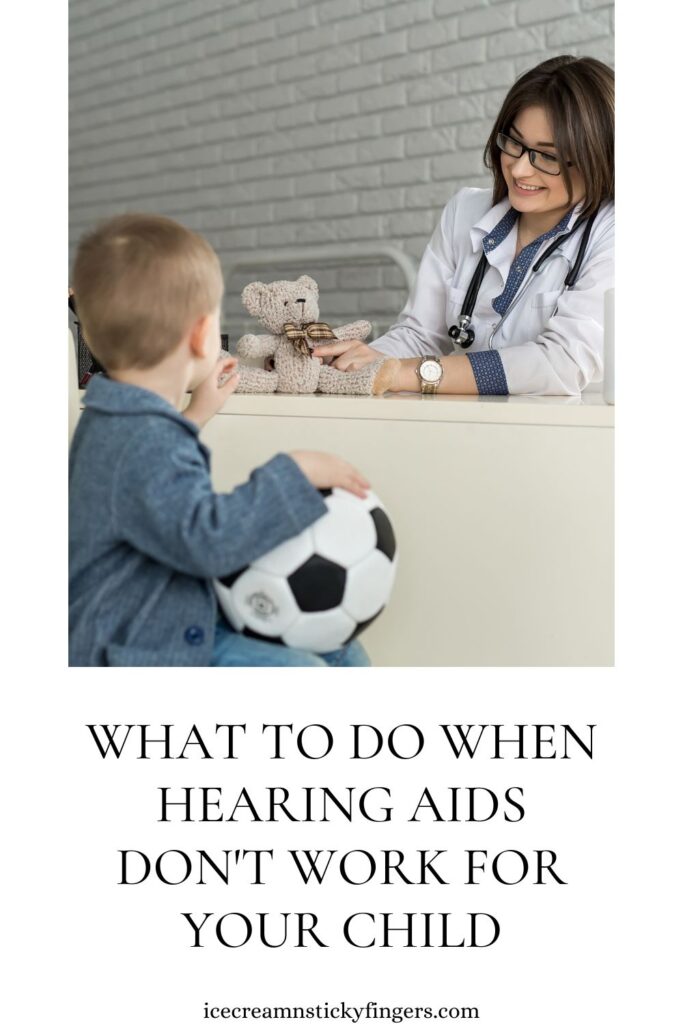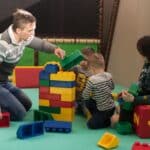What to do when hearing aids don’t work for your child? I’m sure by now that you and your child are frustrated. But some things can help your child with their hearing. It’s important to take a proactive and comprehensive approach to address the situation.
My daughter was born with a profound to severe hearing loss. Hearing aids didn’t work for her. She would just take them off but we had to try them before insurance would consider cochlear implants. She received her first cochlear implant at the age of 4. My daughter is now 29 years old and has a stable job, is married, and does well. I decided not to drop sign language even though our audiologist and doctor recommended it. But at the end of the day, without her implant on, she is still deaf.

Consult an Audiologist
If you suspect that the hearing aids are not working as expected, consult with a pediatric audiologist. They are specialists in diagnosing and managing hearing-related issues in children. They can assess the child’s hearing and the performance of the hearing aids, and recommend appropriate adjustments or alternatives.
Check the Hearing Aid Settings
Sometimes, the issue might be with the hearing aid settings. Ensure that the hearing aids are properly adjusted to the child’s specific hearing needs. Changes in a child’s hearing or growth can affect the way the hearing aids function.
Maintenance and Cleaning
Make sure that the hearing aids are clean and well-maintained. Earwax, moisture, or debris can interfere with their functioning. Follow the manufacturer’s guidelines for cleaning and maintenance. Buy a hearing aid cleaning kit here (aff link).
Educate and Involve the Child
Depending on the child’s age and understanding, it can be beneficial to involve them in discussions about their hearing and the options available to them. Educating them about their condition and the different assistive technologies can empower them to take an active role in managing their hearing health.
Consider Assistive Listening Devices (ALDs)
Depending on the child’s specific needs, an audiologist might recommend assistive listening devices that can work alongside or in conjunction with the hearing aids. ALDs can enhance the child’s ability to hear in challenging environments, such as classrooms or noisy places.
Explore Different Hearing Aid Options
If the current hearing aids are not effective, discuss with the audiologist about trying different types or brands of hearing aids. Technology is constantly evolving, and there might be newer options that better suit the child’s needs.
Address Any Medical Issues
Some children might have medical conditions that affect their hearing. It’s important to rule out any underlying medical issues that could be contributing to the ineffectiveness of the hearing aids.
Explore Alternative Communication Methods
In addition to traditional spoken language, consider alternative communication methods such as sign language or visual supports. These can provide additional avenues for communication, especially if the child is struggling with spoken language development despite using hearing aids.
Seek Support Groups
Connecting with other families who have children with hearing loss can provide valuable support and insights. Support groups or online communities can offer a platform to share experiences, learn from others, and access resources that can help navigate the challenges associated with hearing loss.

Monitor and Adjust
Regular monitoring of the child’s hearing and communication development is essential. Periodic follow-up appointments with the audiologist can help track progress and make any necessary adjustments to the treatment plan.
Consider Environmental Modifications
Making modifications to the child’s environment can help minimize background noise and improve their ability to hear. This could include using FM systems in classrooms, ensuring good lighting for lip-reading, and reducing background noise at home.
Speech Therapy and Auditory Rehabilitation
Even with hearing aids, some children might require speech therapy or auditory rehabilitation to develop their language and communication skills. These therapies can help them make the most of the auditory input they receive.
Consider Cochlear Implants
In cases where hearing aids are not providing sufficient benefit, cochlear implants might be an option. Cochlear implants are surgically implanted devices that directly stimulate the auditory nerve, bypassing damaged parts of the ear. The decision to proceed with cochlear implants should be made in consultation with medical professionals and based on thorough evaluation.

Supportive Environment
Create a supportive environment that encourages open communication and accommodates the child’s hearing needs. This might involve working with educators, caregivers, and others involved in the child’s life to ensure they have the necessary tools and strategies to facilitate communication.
Advocate for the Child
If you feel that the child’s needs are not being adequately addressed, don’t hesitate to advocate for them. Seek second opinions if necessary and work closely with medical professionals to find the best solution for the child’s unique situation.
Emotional Support
Dealing with hearing loss can be emotionally challenging for both the child and their family. Ensure that the child receives the emotional support they need to cope with any feelings of frustration, isolation, or anxiety. Counseling or therapy may be beneficial for addressing these emotional aspects.
Advocate for Accessibility
Advocate for accessibility and inclusion in educational and community settings. Work with schools, recreational programs, and other institutions to ensure that accommodations are in place to support the child’s participation and access to information.
Celebrate Achievements
Recognize and celebrate the child’s achievements, no matter how small. Encouragement and positive reinforcement can boost their confidence and motivation to overcome challenges associated with hearing loss.
Stay Positive and Patient
Finally, maintain a positive attitude and be patient throughout the journey. Hearing loss is a manageable condition, and with the right support and interventions, children can thrive and reach their full potential.
Remember that each child’s hearing needs are unique, and there is no one-size-fits-all solution. Working closely with medical professionals and specialists will help you determine the most appropriate course of action for the child’s hearing well-being. Here are some tips on what to do when hearing aids don’t work for your child. Use the tips you resignate with and help advocate for your child.








Thank you for sharing such a thoughtful article on what to do when hearing aids don’t work for a child. Your personal touch and practical advice make it a reassuring read for parents facing this challenge.
It would be difficult for parents to face such a challenge. It’s great that you’re sharing such helpful tips.
i know of parents who faced tough times when their children were going through hearing issues.. your post has so many useful pointers and tips that is sure to help parents face this with confidence and knowledge
Your story is inspiring! Exploring all options and persistence can lead to positive outcomes. Thanks for sharing!